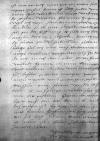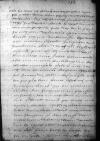List #423
Johann Albrecht of Brandenburg-Ansbach do Ioannes DANTISCUSToledo, 1529-01-31
| odebrano Valladolid, [1529]-02-08 Rękopiśmienne podstawy źródłowe:
Pomocnicze podstawy źródłowe:
| ||||||
Tekst + aparat krytyczny + komentarz Zwykły tekst Tekst + komentarz Tekst + aparat krytyczny
[We]sunderem gutten [freundt her]n
[Zw ey]gnen handen
Lyber her orator.
Ich hab euch vor vergangene tagen pey euerem dyner dem
Aber mit meiner handtling mit
Ferner schick ich euch himit ein brieff zu an meinen bruder, den
Ist nun an euch, mein pyt ein gutter sol <l> icitator zu sein, damit ich selche futter von seiner lyeb uberkomen mug und wa[s] dy gesten werden her einer zu penig wyl ich von stund an wyder wecz[a]len dem, so ir mir schreyben werdt, gesel. / Pin der hoffnung, ir seldt euch dermassen darein schicken, damit mi[r] dy futter paldt zukummen sellen.
Selchs hab ich euch aus gutter mainu[ng] nicht wellen verhalten als zu den, do ich mich dan alles gutten zune... welledt hymit meiner komara und euerem
Datae


